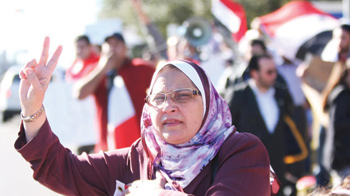SOCIAL MEDIA (R)EVOLUTION
Kristin Manrique
The Signal
Egyptians have surprised the world with their technological ingenuity, which resulted in the overthrow of a government dictator. The uprising in Egypt is a prime example of youth effectively using social media to bring about social reform.
The nearly 30 year reign that President Hosni Mubarak held over Egypt ended Feb. 11 due in part to the country’s younger generation creating a viral message of defiance towards the Egyptian government.
People posted videos on YouTube, tweeted protest locations and documented on Facebook the atrocities committed in their homeland. Communication through social media played a vital role in instilling change and promoting democratic reform in Egypt.
Everette Penn, assistant professor of criminology, was awarded a Fulbright Scholarship that allowed him to teach in Egypt, as well as absorb the culture.
Penn observed Egypt’s technological modernity firsthand. Penn said, once technology merged with a strong political message, an uprising was only a matter of time.
“A revolution for a deprived people is only one meal away,” said Penn. “The question is not if, but when. Social media provided the means to communicate quickly and broadly to a wide array of people in Egypt. I believe once people access information and have the ability to discuss, verify and analyze change occurs because an alternative is discovered. This is what we are seeing in Egypt and throughout the Middle East.”
Nearly a year ago, Wael Ghonim, the 30-year-old Google executive and Internet activist, began voluntarily organizing a Facebook page that promoted democratic reform in Egypt and chronicled the work of Egyptian Nobel Prize winner and politician Mohamed ElBaradei. Ghonim noticed his Facebook pages’ progress at providing information, conversing and sharing ideas with likeminded individuals.
This inspired Ghonim to launch another page campaigning against police brutality in Egypt, spur strong camaraderie amongst users and produce volunteerism throughout the country.
Ghonim would adopt the alias El Shaheed, or The Martyr, to secure his anonymity. Unfortunately, Egyptian security forces discovered his identity. He was abducted and held for two weeks while the movement continued. He was later released and became known worldwide as the face of the Egyptian social media revolution.
Marcus Messner, associate professor of journalism and mass communication at Virginia Commonwealth University, researches social media’s influence on media coverage, as well as media organizations’ embrace of these sources of instant communication. He has published books pertaining to this specific subject, created his own website and blog, and written articles for various academic journals.
“It is very difficult to monitor all of social media as millions of users can access them,” Messner said. “Once a message is posted, it is very difficult to censor tweets and retweets. Some of the technology advancements that are common to us by now also seem to have surprised the rulers in these countries.”
What began as a way to catch up with friends and family has shifted into a whole new realm of communicating. SixDegrees launched in 1997 and the application style became known as “Web 2.0.” Friendster established a social media service in roughly 2002. MySpace became the trend when the site bowed in 2004, but Facebook (also introduced in 2004) as well as Twitter (2006) will forever be associated with giving youth a voice to implement social reform campaigns.
History has proven that, regardless of the message, communication combined with technology has the ability to drastically alter life as we know it.
Throughout history dictators have understood the importance of establishing power by gaining control of its country’s media. These tactics only acknowledge one side of an issue and push a specific agenda. The Egyptian government overlooked or underestimated the ferocity and influence of new-technology and the younger generation’s embrace of social media to communicate.
“Almost all print and broadcast media in these countries are state controlled and give no coverage to opinions or movements critical of the government,” Messner said. “YouTube gives protesters an additional channel to report what is really happening on the ground. If you just look at the uprising in Libya, you can see that we would hardly know anything about protests without social media and mobile technology.”



Don’t give into the hype. The numbers simply don’t bear this article’s claims out.
http://blogs.computerworld.com/17810/is_the_role_of_social_media_in_egypt_being_overstated